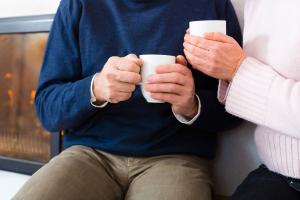Cold weather health advice and keep neighbours in mind
Date published:

Keep safe
Keep in contact with trusted callers, friends and relatives.
If you're worried and need help, contact them or a health professional. They will make sure that your needs or concerns are brought to the attention of someone who can help.
There are a few things you can do to keep you and your loved ones safe during cold weather:
- wear warm clothes - layers are best, including a hat and gloves
- heat all rooms you use during the day - living room to around 18 to 21°C (64 to 70°F) and the rest of your house to at least 16°C (61°F)
- if you can’t heat all your rooms, make sure to keep one room warm throughout the day
- heat your bedroom before going to bed
- never use an electric blanket and hot water bottle together as it could cause electrocution
- wear bed socks and thermal underwear at night
- get your heating boiler and appliances serviced yearly by a registered engineer to protect from the dangers of carbon monoxide
- make sure you have enough food and medicines
- take regular hot drinks and food
- check the weather forecast regularly
- take care outdoors, especially if roads and pavements are icy
- if outside in icy conditions, wear boots or shoes with suitable grips
- keep your mobile phone charged
You can find useful information and advice on the following pages:
Offer help
Think about friends, family or neighbours who may be less mobile.
Offer help ahead of any cold weather spell.
This could mean:
- picking up essentials such as food, gas or electricity top-ups
- getting repeat prescriptions
If you are worried about a relative or an older neighbour, contact your local council.
Using the health service
Should you or someone in your family become unwell this winter, think carefully about how to use health services.
Emergency and 999 services are for life-threatening and serious conditions.
Emergency Departments are the right place to go if you're injured or think you are seriously ill.
The A to Z symptom checker, pharmacist, minor injury unit, GP, and out-of-hours services are available for any other health concerns you may have.
If you get a repeat prescription, leave yourself enough time to order it from your GP.